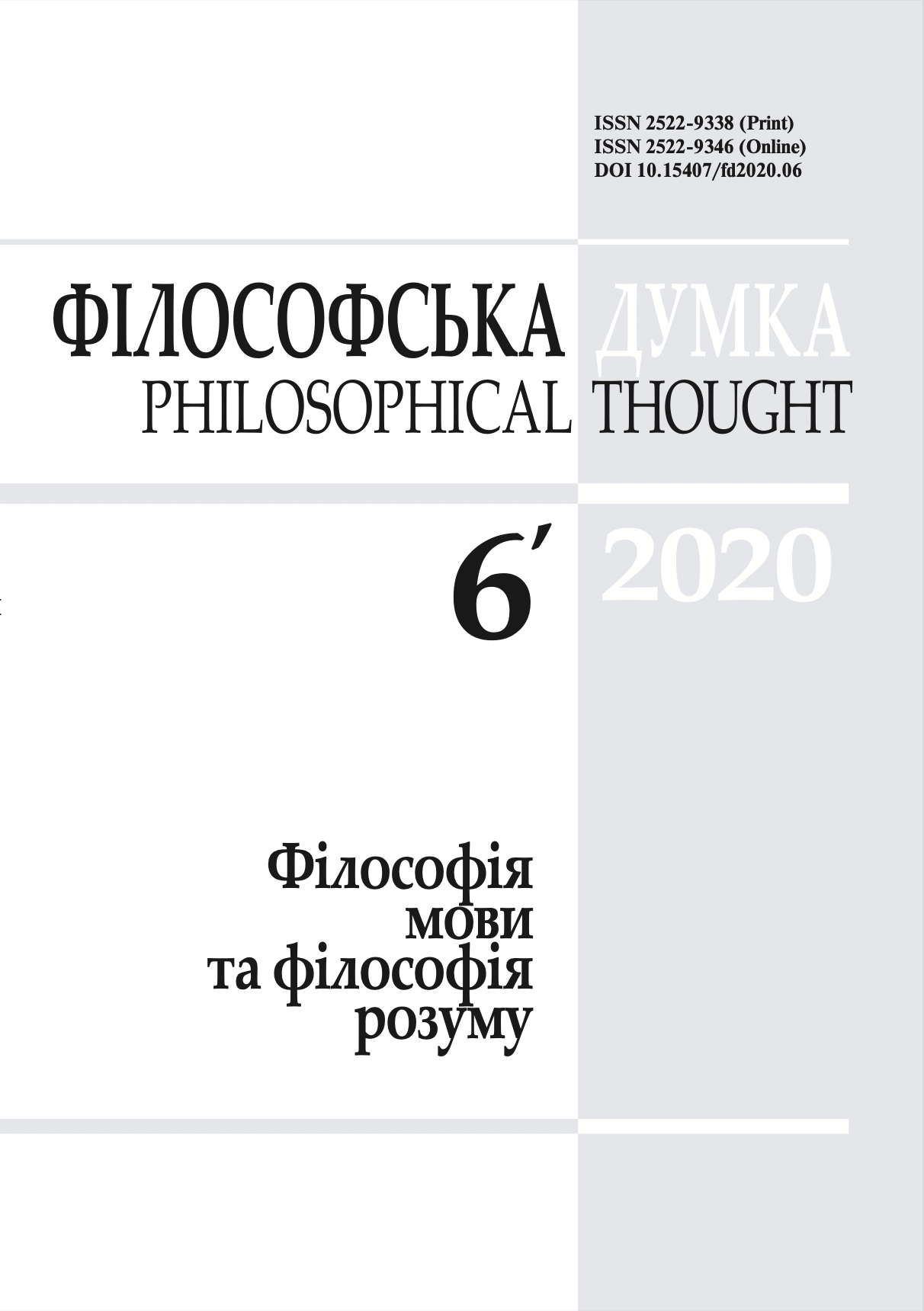Justification under uncertainty
Analytics of subjectivity and intersubjectivity
DOI:
https://doi.org/10.15407/fd2020.06.078Keywords:
failure of justification transmission, justification, transmission of justification, uncertaintyAbstract
Belief formation and justification of belief is the subject of epistemology, philosophy of mind, and philosophy of action. In this article we are mostly interested in the application of ana- lytic techniques for the explication of belief justification under uncertainty. We need to explicate this phenomenon in order to answer, at least in part, the question of what are the features of reasoning made in conditions that cause doubts, how people make decisions in such conditions.
Arguments used for the justification of such decisions have the status of plausible arguments. The crucial issues related to the analysis and evaluation of plausible arguments are of the acceptability of the premises and the transmission of their acceptability to the conclusion. In this article, we have focused on the transition from the premises to the conclusions of plausible arguments, on the transmission of justification of premises to the conclusions. To establish the peculiarities of such a transmission an outline of the semantics for such arguments is proposed. Its key component is the measures of the plausibility of the premises and rules of inference.
A plausible argument itself does not provide the ultimate reason for accepting its con- clusion. The justification of the conclusion also depends on other arguments that support or defeat it. So to establish the degree of justification of the conclusion we need to attribute the weights to the premises and rules of inference.
We hope that this study provides at least a preliminary answer to the question of how the failure of the transmission of justification in plausible arguments differs from the failure of transmission in deductive arguments.
References
Hage, J. (2005). Studies in Legal Logic. Dordrecht: Springer.
Kyburg, H. E. jr. (2011). Logic, Empiricism and Probability Structures. In: Fundamental Uncertainty: Rationality and Plausible Reasoning / Ed. by S. Marzetti Dall'Aste Brandolini, R, Scazzieri (pp. 23-38). New York: Palgrave Macmillan.
https://doi.org/10.1057/9780230305687_2
Levi, I. (2011). The Weight of Argument. In: Fundamental Uncertainty: Rationality and Plausible Reasoning / Ed. by S. Marzetti Dall'Aste Brandolini, R. Scazzieri (pp. 39-58). New York: Palgrave Macmillan.
Moretti, L., Piazza, T. (2013).Transmission of Justification and Warrant. In: The Stanford Encyclopedia of Philosophy. Retrieved from: https://plato.stanford.edu/entries/transmission-justification-warrant/
Pollock, J. L. (2010). Defeasible Reasoning and Degrees of Justi cation. In: Argument and Computation, 1 (1), 7-22.
https://doi.org/10.1080/19462161003728921
Sextus Empiricus (1976). Against the Scientists. In: Works in Two Volumes (vol. 1, pp. 59-376). [In Russian]. Moscow: Mysl'.
Tucker, C. (2010). When Transmission Fails. In: Philosophical Review, 119, 497-529.
https://doi.org/10.1215/00318108-2010-012
Verheij, B. (2014). Arguments and Their Strength: Revisiting Pollock's Anti-Probabilistic Starting Points. In: Computational Models of Argument, 433 - 444.
Walton, D., Tindale, C. W., Gordon, T. F. (2014). Applying Recent Argumentation Methods to Some Ancient Examples of Plausible Reasoning. Argumentation, 28 (1), 85-119.
https://doi.org/10.1007/s10503-013-9306-y
Wright, C. (2002). (Anti-)Sceptics Simple and Subtle: G. E. Moore and John McDowell. Philosophy and Phenomenological Research, 65: 330-348.
https://doi.org/10.1111/j.1933-1592.2002.tb00205.x
Wright, C. (2003). Some Reflections on the Acquisition of Warrant by Inference. In: New Essays on Semantic Externalism and Self-Knowledge / Ed. by S. Nuccetelli (pp. 57-77). Cambridge, MA, London: A Bradford Book, The MIT Press.
Downloads
-
PDF (Українська)
Downloads: 224
Published
How to Cite
Issue
Section
License
Authors who publish with this journal agree to the following terms:
- Authors retain copyright and grant the journal right of first publication.
- Authors are able to enter into separate, additional contractual arrangements for the non-exclusive distribution of the journal's published version of the work (e.g., post it to an institutional repository or publish it in a book), with an acknowledgement of its initial publication in this journal.
- Authors are permitted and encouraged to post their work online (e.g., in institutional repositories or on their website) prior to and during the submission process, as it can lead to productive exchanges, as well as earlier and greater citation of published work (See The Effect of Open Access).


